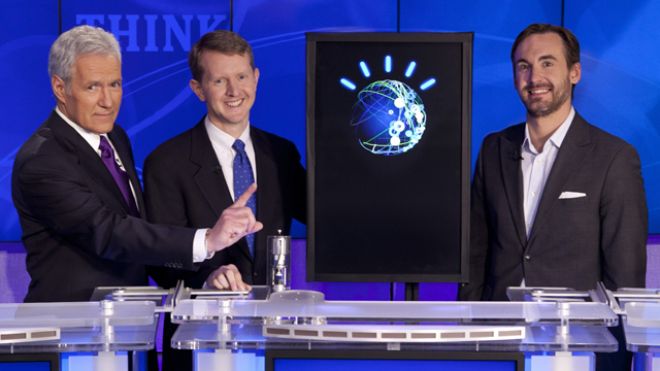
Computer technology pioneer Alan Turing considered the mark of true artificial intelligence to be the ability of a machine to have a conversation that accurately mimics human communication. Common speech is full of complexity that we hardly notice because it has been “programmed” into us since the day we were born. To us, slang, profanity, and idioms come as second nature. But to a machine, these nuances are completely baffling. So far, no one has been able to crack the secret of artificial intelligence that can produce and understand “small talk” without appearing awkward and, well, artificial.
In 2011, Watson went on Jeopardy! against the two top contestants, Ken Jennings, winner and record holder of the most consecutive games in show history, and Brad Rutter, highest earning winner in show history. Watson proved to be more than a capable competitor, winning with $77,147. Jennings came in second place with $24,000, and Rutter finished last with $21,600. It was clear that Watson had been well-programmed with a wealth of knowledge covering all subjects, even pop culture references.
Two years ago, researchers at IBM tried to change this by teaching their famously brainy supercomputer some slang. Watson, the refrigerator-sized computer, already holds an unimaginably vast library of information, but it couldn’t quite get a handle on the ambiguities and complexities of human speech. The challenge for IBM researchers was to teach Watson how to handle subtlety.
So how do you introduce a computer to the vast variety of English slang? Fortunately for the researchers, we already have an extensive list of words and phrases that make up colloquial English, and if you’ve ever been on the internet before, you’ve probably used it. It’s called Urban Dictionary, and it’s a constantly-expanding collection of slang words and phrases and their definitions added by users. In order to help Watson understand more about common speech, researchers taught Watson all of Urban Dictionary. This allowed the computer to understand everything from the most common slang to the most obscure phrases.
Unfortunately, Urban Dictionary also taught Watson to have a very dirty mouth. Because the supercomputer had no way of classifying which words were offensive and which were not, it often used inappropriate words and phrases regardless of whether the situation called for them. Humans learn which words are “bad” based on a lifetime of social feedback and cultural information, but an artificial “mind” never gets these hints. Inoffensive, colloquial slang and cursing were one and the same to Watson. The computer even responded to researchers’ questions with common profanity.
Eventually, IBM’s research team had to remove Watson’s new vocabulary. You may be able to teach an old computer new words, but it seems you can’t teach it good manners yet.

Comments are closed.